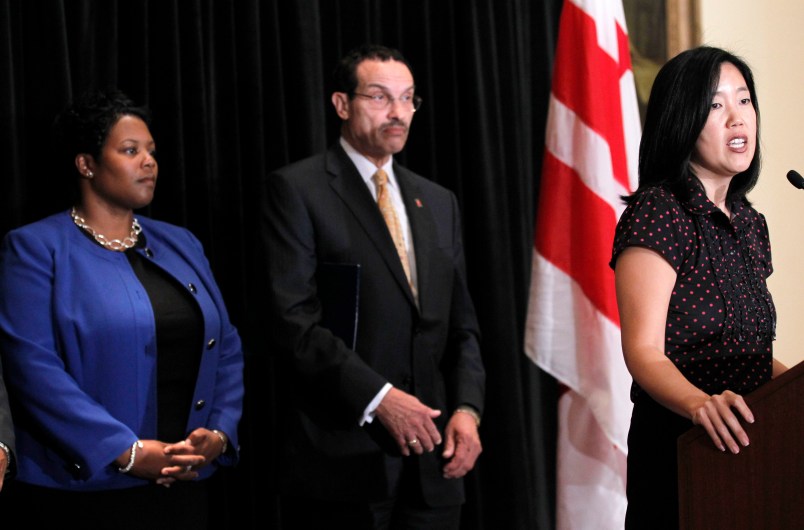Washington, D.C.’s Democratic Party is holding its mayoral primary today, and — for the first time in years, all’s quiet on the education front. Sure, there are pending arguments around the shuffling of boundaries for neighborhood schools, but there’s no serious push to roll back — or strenuously expand — the controversial reforms of Adrian Fenty’s Administration. The rapidly growing charter school sector and Fenty-era teacher evaluation system are in the city to stay.
Fenty and his jet-propelled schools chancellor, the divisive Michelle Rhee, more or less accomplished what they set out to do: they remade Washington, D.C.’s school system in fundamental and lasting ways. If the polls are right, all of the leading candidates are operating within the confines of their towering legacy. The broader debate is settled. Fenty and Rhee are the clear winners, no matter who emerges victorious today.
But this win came at a price. Fenty lost his job four years ago (after just one term), to a candidate promising to “collaborate” with the teachers union that Fenty and Rhee repeatedly steamrolled. Vincent Gray’s win in 2010 was widely viewed as an electoral repudiation of Fenty and Rhee’s brand of education reform.
And yet, things didn’t change much under Gray’s administration. While federal investigations have recently turned up evidence of hundreds of thousands of shadowy campaign dollars sloshing around in support of Gray’s victory in 2010, he’s been a reasonably effective steward of the District’s schools. His chancellor, Kaya Henderson, was a former Rhee deputy. No surprise, then, that charter schools have continued to grow — and have been granted increased access to unused district school buildings. The teacher evaluation system has faced just small adjustments. And test scores continue to climb.
All this could be a lesson for another city struggling with the debate over school reform. On a recent visit to Chicago, I couldn’t help but notice how their political situation resembled DC’s in the early Fenty years. In 2012, the Chicago Teachers Union greeted new mayor Rahm Emanuel’s reforms with a bruising strike, which took an enormous levy on Emanuel’s political capital. When I was there, a year after the strike, there was ample evidence that relations between City Hall and city teachers had scarcely improved. Everyone I spoke with seemed to agree on two things: 1) the union had more or less won the strike, and 2) they still hated the outcome.
Most importantly, every Chicago Public school teacher that I interviewed wanted Emanuel gone. They want to toss him off the end of Navy Pier—just like D.C. teachers wanted to hurl Fenty into the Potomac. Like Rhee, Emanuel is a divisive, polarizing figure who thrives on conflict.
In D.C., they sent Fenty packing. But in Chicago, they don’t expect that they can get rid of Emanuel. The teachers I spoke with were frustrated that there was no alternate agenda around which they might coalesce — let alone a candidate who might be capable of carrying it forth. Chicago journalists roll their eyes if you ask whether Emanuel will face a serious reelection challenge next year. He’s almost certain to survive into a second term.
There may be a lesson for Chicago in how D.C. politics played out. It suggests that Fenty’s loss might actually have been a reasonably lucky outcome for the policies he was advancing. As it turned out, Gray’s opposition to reform was purely rhetorical. He wanted Fenty’s job, but he wasn’t committed to returning the city to its 2006 educational status quo. All in all, Gray’s tenure lowered the political temperature and consolidated Fenty’s gains. The last four years are evidence that the onetime “reforms” have become the baseline. Here, the argument isn’t whether we’ll have a consequential teacher evaluation system, but how we’ll weight the one we have. And this has been great for DC students, families, and teachers.
But there’s little prospect of that happening in Chicago (whose mayoral election is just under a year away). So: what happens in a city where the controversial education reformers stay in power? Painful, paralytic gridlock.
But that means that Emanuel’s reforms—Chicago’s new teacher evaluation system, district school consolidation, a longer school day, etc—will remain contentious. The ideas they contain are inseparable from his political baggage. Whatever their merits, now they represent Emanuel, and he’s poison for the teachers union. If Chicago found its own Vincent Gray who could dispatch Emanuel, it would go a long way toward ending the standoff without necessarily undoing the reform progress he’s made.
We often note that successful transitions to democracy require a transition of power. One party has to lose and exit gracefully to demonstrate that the institutions can, in fact, govern. This sort of consolidation is critical for reform policies as well: until they survive a transfer of power, they’re much more susceptible to being opposed and repealed (Cf. Obamacare). So as D.C. Democrats go to the polls today to choose their candidate — who will be likely to win the mayoral contest in November — Chicago voters should be watching enviously.
Conor P. Williams, PhD is a Senior Researcher in New America’s Early Education Initiative. Follow him on Twitter: @conorpwilliams.






